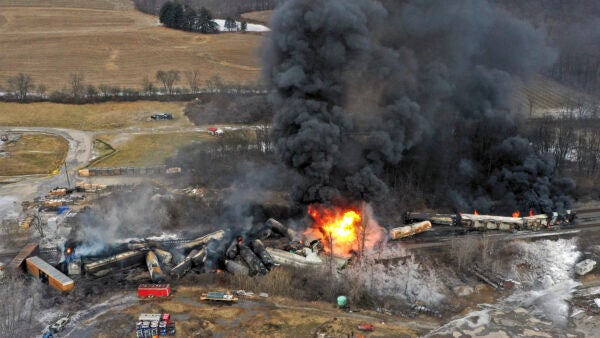Norfolk Southern’s lanes linking the Northeast with markets in the Midwest may continue to face disruptions as the railroad seeks to fully restore network fluidity following a train derailment that occurred Friday evening in Ohio near the Pennsylvania border.
In a Thursday update, NS (NYSE: NSC) said it has restored service to mainline 2 at the site now that it has cleared the track. It is still seeking to restore mainline 1. NS had to cease service since last Friday evening through those lines as it cleared the site from debris.
But customers should anticiplate availability delays of at least 24 hours to occur on the following lanes: between Chicago and the Northeast; the Port of New York and New Jersey and Cleveland/Detroit/Ohio Valley; Kansas City, Missouri, and St. Louis and the Northeast.
On Friday at 8:55 p.m. EST, an NS train originating from Madison, Illinois, was en route to Conway, Pennsylvania, when it derailed at East Palestine, Ohio, near the Ohio-Pennsylvania border. The train, which consisted of 141 loaded cars, nine empties and three locomotives, included 20 rail cars carrying hazardous materials. Of those 20, 10 derailed, and five of those 10 carried vinyl chloride, according to the National Transportation Safety Board, which arrived at the scene on Saturday to start investigating possible causes for the crash.
The train’s crew — a locomotive engineer, conductor and conductor trainee — were unharmed, and no one was reported injured at the scene. However, the derailment blocks NS’ two main tracks.
While NTSB declined to provide any potential causes of the derailment, the agency obtained two videos showing that mechanical issues on one of the rail car axles could have been a factor. The train’s crew had also received an alarm from a wayside defect detector shortly before derailment, which in turn initiated the emergency brake application, according to NTSB board member Michael Graham.
Investigators were also able to walk portions of the track nearby the derailed cars and determine where the derailment might have occurred, Graham said in a Sunday press conference.
The derailed cars and an associated blaze prompted local officials to evacuate residents living within a 1-by-2-mile area of the derailment, which included communities in Ohio and Pennsylvania. Vinyl chloride is an unstable material that can cause toxic fumes and create deadly shrapnel should any of the rail cars explode, officials said.
The evacuation order remains in place on Wednesday as NS as well as state and federal officials with the Environmental Protection Agency continue to monitor air and water quality.
Officials also reported that NS successfully executed a controlled release of vinyl chloride from the rail cars on Monday afternoon, and fires on the five rail cars carrying vinyl chloride have been extinguished. Four out of five rail cars have also been excavated from the site and will be staged for NTSB.

NTSB board member Michael Graham said Saturday during a press conference that his team will gather perishable evidence and interview the train’s crew, while others from NS, EPA, the Federal Railroad Administration and the SMART union will also be part of the investigation and cleanup. SMART stands for the International Association of Sheet Metal, Air, Rail and Transportation Workers.
“This is the beginning of a long process. We will not jump to any conclusions,” Graham said. A preliminary report will come out in four to six weeks, while a full investigation can last 18-24 months, he said.
Subscribe to FreightWaves’ e-newsletters and get the latest insights on freight right in your inbox.
Click here for more FreightWaves articles by Joanna Marsh.








Mike Britzki
Hi, if NS is anything like its rival and I know for a fact it is,then,NS will cover its tracks(lol)like you’ve never seen before.CSXT is it’s competition on the east coast. They preach safety but you are always rushed.Cutting men from jobs putting track safety on back burner along with working men every 8 hrs is what they do best. I would love to have my voiced heard for the people in East Liverpool. If there’s a way to get out of paying and making things safe NS will be at the front leading the way with CSXT. FRA knows this all too well. I personally was threatened when I was injured with retaliation from management, it’s a nightmare working for these companies. Call me to testify or speak on behalf of all the workers who have been intimidated by theses companies. I bet I don’t hear anything. God help the people of Ohio.